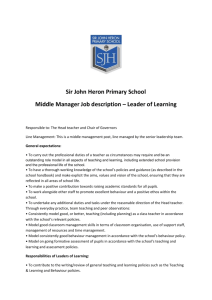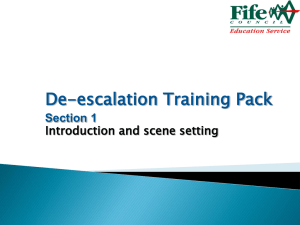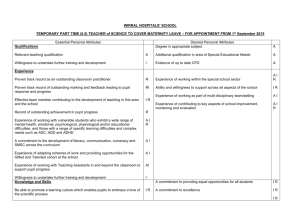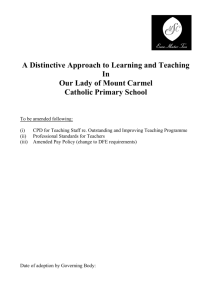St.Martha`s Senior School
advertisement
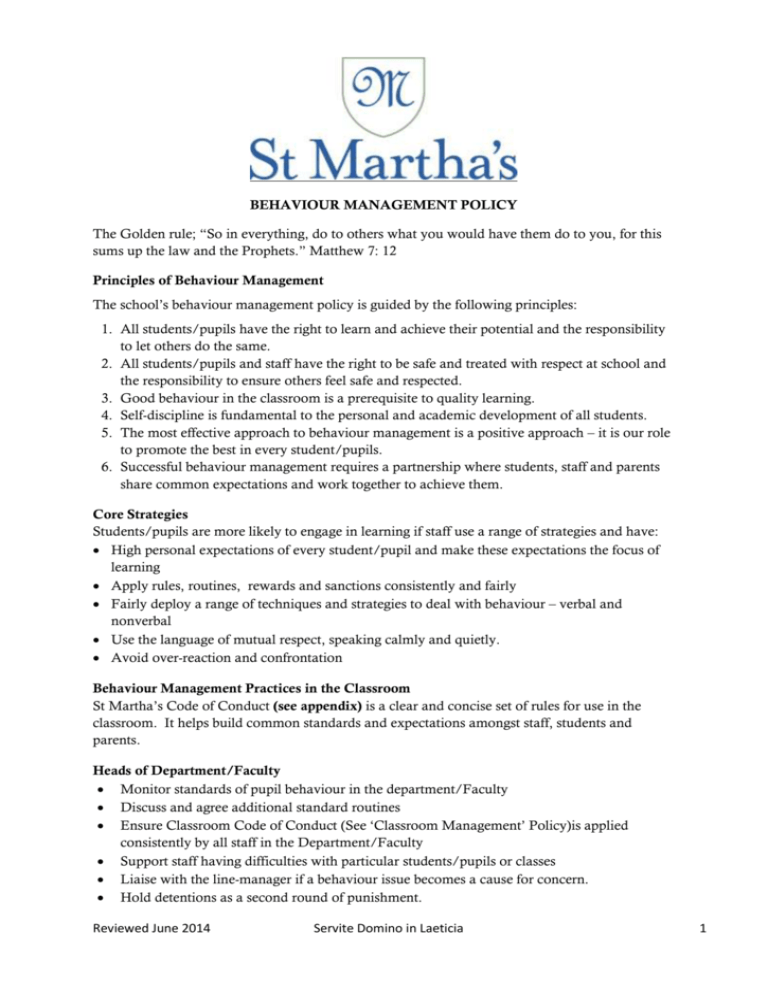
BEHAVIOUR MANAGEMENT POLICY The Golden rule; “So in everything, do to others what you would have them do to you, for this sums up the law and the Prophets.” Matthew 7: 12 Principles of Behaviour Management The school’s behaviour management policy is guided by the following principles: 1. All students/pupils have the right to learn and achieve their potential and the responsibility to let others do the same. 2. All students/pupils and staff have the right to be safe and treated with respect at school and the responsibility to ensure others feel safe and respected. 3. Good behaviour in the classroom is a prerequisite to quality learning. 4. Self-discipline is fundamental to the personal and academic development of all students. 5. The most effective approach to behaviour management is a positive approach – it is our role to promote the best in every student/pupils. 6. Successful behaviour management requires a partnership where students, staff and parents share common expectations and work together to achieve them. Core Strategies Students/pupils are more likely to engage in learning if staff use a range of strategies and have: High personal expectations of every student/pupil and make these expectations the focus of learning Apply rules, routines, rewards and sanctions consistently and fairly Fairly deploy a range of techniques and strategies to deal with behaviour – verbal and nonverbal Use the language of mutual respect, speaking calmly and quietly. Avoid over-reaction and confrontation Behaviour Management Practices in the Classroom St Martha’s Code of Conduct (see appendix) is a clear and concise set of rules for use in the classroom. It helps build common standards and expectations amongst staff, students and parents. Heads of Department/Faculty Monitor standards of pupil behaviour in the department/Faculty Discuss and agree additional standard routines Ensure Classroom Code of Conduct (See ‘Classroom Management’ Policy)is applied consistently by all staff in the Department/Faculty Support staff having difficulties with particular students/pupils or classes Liaise with the line-manager if a behaviour issue becomes a cause for concern. Hold detentions as a second round of punishment. Reviewed June 2014 Servite Domino in Laeticia 1 Class Teachers Apply and reinforce the Classroom Code of conduct – See Policy ‘Classroom Management’ Establish and use basic routines e.g. entry, taking the register and exit on the bell Arrive on time to lessons and start them punctually Use a seating plan where appropriate Share the learning objectives and learning outcomes with the students at the start of the lesson Use differentiated materials as appropriate Model the standard of courtesy expected from students/pupils Address poor behaviour Criticize the behaviour, not the student/pupil Use private rather than public reprimands (break time detentions) Use the school rewards to support good behaviour with House Points and student of the Week awards. Use the school system of sanctions to address poor behaviour Discuss students/pupils whose behaviour is causing a concern with the HOD/HOF Carry our peer observation as a means of developing new ideas Praise and Reward Overview Praise and rewards are the cornerstone of successful behaviour management. Research findings are clear: schools, which have a strong emphasis on positive praise and rewards, are more successful at managing students’ behaviour than those that stress sanctions. Praise and rewards should therefore be used much more frequently than sanctions. All staff should award them consistently, fairly and regularly. When some members of a class are not cooperating fully, it is often more effective to praise those who are behaving than to threaten those causing problems. All Staff Praise students/pupils both orally and in their books and diaries Inform parents through diaries Award House Points using their card House Points should be awarded for: Effort Following the Code of Conduct Excellent work Improvement A positive contribution to school life Award with commendations, certificates and excellence badges Suggest a student/pupil of the week to their Head of Faculty (1 per Key stage) Display student/pupil work Reviewed June 2014 Servite Domino in Laeticia 2 Housemistresses Issue commendations and certificates in their assemblies Encourage all staff to ensure that rewards have been logged on the system Arrange for Rewards to be made public by the newsletter Provide opportunities for praise at whole school assemblies Reward involvement in Inter House events Organise an assembly each term to celebrate awards SANCTIONS AND SERIOUS INCIDENT REPORTS Overview Students/pupils have the right to expect fair and consistently applied sanctions for poor behaviour which make a clear distinction between serious and minor incidents. Classroom Teacher deals with the incident and writes a Serious Incident Slip if this is warranted. This is then passed to a member of SLT and it is logged. The teacher can also log the incident on Progresso. If the classroom teacher cannot deal with the incident s/he writes a Serious Incident Slip and passes it to the Head of Faculty who will take the necessary action. This will be recorded on the Incident Slip and filed with the information being logged. If the member of staff cannot deal with the incident and the student/pupil is removed from the lesson the Head of Faculty should ensure that home contact is made or a departmental detention is set. If the incident is not resolved use the SLT to follow the incident through. For break time or corridor incidents the teacher deals with the issue and completes a pastoral detention slip. Student/pupil Behaviour outside of the School Student/pupil behaviour on school outings is subject to the Behaviour management Policy Poor behaviour by students/pupils in the vicinity of the school or on the journey to or from the school, will be subject to the Behaviour Management Policy Students/pupils are asked to sign a behaviour contract before residential trips. School secretary Will enter incident information on the database Distribute letters to Parents Inform Housemistress of detention Create lists of all detentions Reviewed June 2014 Servite Domino in Laeticia 3 Behaviour Reports Students/pupils are placed on report to monitor their behaviour, attendance or punctuality. Students/pupils can be on report to: Tutor Housemistress Deputy Head Headmaster Students/pupils must get their report signed at the end of each lesson and must report to their Tutor/Housemistress/Deputy Head daily. Strategies To use a diagnostic approach when analysing student Incident slips To monitor the use of classroom Behaviour reports To refer students/ pupils as appropriate to either Learning support or outside agencies To identify students/pupils at risk of permanent exclusion and to set up Pastoral Support Plans To review students/ pupils progress and keep parents and teachers informed Parents Involvement Parents are informed by phone/email if staff are concerned about their daughter’s behaviour Parents are requested to attend a meeting with the Tutor/Housemistress if behaviour has not improved Parents are informed by letter if their daughter is going to be on detention or a serious warning Parents are called to see the Headmaster for an exclusion Fixed Term or Permanent Exclusion When considering exclusion account will be taken of the personal circumstances of the student/pupil. Exclusion will be used: Where the initial incident is considered so serious that no other sanction is deemed suitable e.g. assault, bullying, carrying anything that could be conceived to be a weapon or drug related incident Where all other sanctions have been tried and it is felt there is no other alternative route. Deciding whether to exclude a student/pupil Only the Headmaster or, in his absence the Deputy Head or a senior teacher acting with his authority can exclude a student from school The decision to exclude a student is a matter of judgement for the Headmaster who will take into account the impact of the misconduct on the life of the school. This may include behaviour on or off the school premises which opposes the standards of behaviour expected by the school. Reviewed June 2014 Servite Domino in Laeticia 4 Before making a decision to exclude The Headmaster will: Consider all the relevant facts and evidence available to support the allegations make, taking into account the school’s behaviour and equal opportunities policies Allow the student to give her version of events Check whether the incident may have been provoked Reintegration The Headmaster/Deputy/Housemistress will meet with the student/pupil and her parent(s) when returning from a fixed term exclusion An agreement will be made between the school and the student/pupil Informing parent(s) A letter from the school on behalf of the Headmaster will be sent to inform parents(s) of the length of the exclusion, the reasons for the exclusion and the return date. Reviewed June 2014 Servite Domino in Laeticia 5 Appendix 1 Code of Conduct At St Martha’s we expect the highest standards of conduct around the school and in lessons. The following is our Code of Conduct Each student is expected to: Be punctual to all lessons and events. Arrive properly dressed and equipped for that lesson and event. Observe the rules for each situation. Enter any classroom quietly, place any equipment on the desk and stand at the desk awaiting instructions from the teacher. Work quietly and without fuss following instructions without argument. Listen carefully to the teacher when being spoken to. Raise a hand and sit quietly when wishing to speak or receive help. Use the school diary appropriately. Catch up on missed work. Do nothing to adversely affect the teaching of others. Do everything possible to keep the teaching environment pleasant for all. Should a student have a problem with any aspect of a lesson / event she must speak to her teacher in an appropriate manner, showing respect at all times. If a problem remains unresolved the student may wish to talk to her Personal Tutor or follow the complaints procedure found in this handbook. Health and Safety Rules – it is important to recognise that students/pupils are ultimately responsible for their own safety and must treat any situation in school with respect. At any time hazards may exist and it is everyone’s duty to have this in mind during the school day. There are particular areas where hazards are more clearly evident than others. Places such as PE areas, Technology and Science are good examples. Throughout the school Health and Safety warnings and notices are posted. Students/pupils also have the issues explained to them at various times in the year. It is important that all this information is absorbed and adhered to in the interest of the safety of the community. Please remember not to block corridors or fire exits with your bags. Do not run in the corridors. Wear shoes at all times unless instructed to remove them by a teacher. Wear the correct footwear on the tennis courts –shoes are not suitable/allowed. If any student/pupil sees a situation that she considers to be a risk to her or others she must inform a member of staff immediately and this will then be dealt with as appropriate. Reviewed June 2014 Servite Domino in Laeticia 6


